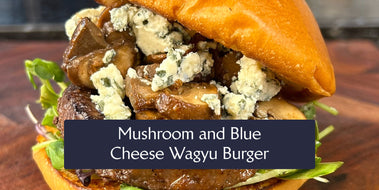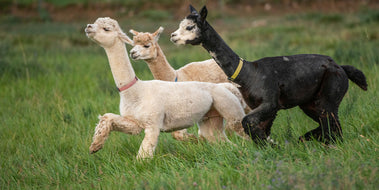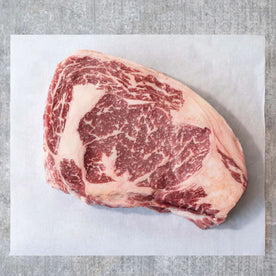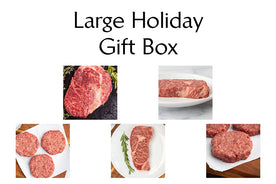Interview With the Beef Doctor
Dr. Ryan Rhoades, our Chief Beef Officer, is one of the foremost experts on beef in the world. He holds a PhD in meat science (yes, that’s a thing), is renowned for producing some of the most marbled Wagyu in the U.S., and is a beef extension specialist at the Colorado State University.
When Miraflora Naturals partnered with his company, Elevation Beef, to create Miraflora Wagyu, he stayed on to manage the cattle and genetics. We had a thousand questions to ask him, from the fascinating origins of this special breed of cattle to how he produced the highest marbled beef this country has ever seen, so we interviewed him at his home in Ft. Collins, Colo., just a quick drive from our farm in Boulder County. Here’s what he had to say.
Miraflora: How did you get interested in beef? How did all this get started?
Dr. Rhoades: I grew up in the Midwest, specifically Indiana, on a small family farm there with a diversified livestock operation. We had pigs and sheep and cattle, and I grew up showing them in 4H. I just developed a love and a passion for livestock in general, and then I was always jealous of kids from the West or the Southwest because cattle and ranching was a hobby where I was from, and it was a lifestyle in Texas and Oklahoma and Colorado. So I always had an eye to move that way.
I went to Oklahoma State University and worked on a very big ranch there. Then I decided to continue school at Texas A&M and spent eight years getting my masters and PhD in meat science and beef production and economics. That's really where my love specifically for Wagyu came along. There are two universities in the country that do Wagyu research, and Texas A&M was one of them. I was fortunate to get into a lab and with an advisor who was working on Wagyu research, and so that's where most of my training comes from. I saw some really interesting things and developed a love and respect for the breed.
Miraflora: You worked at the King Ranch in Texas, which I only know about from binge-watching “Yellowstone.” What was that like?
Dr Rhoades: I was there for seven years doing research and projects—it’s a million acres in South Texas. It's bigger than the state of Rhode Island. Just to put it into perspective, it takes up three counties. I probably saw 5 percent of the ranch in seven years. That's how big it is. I loved my job there, but I didn't necessarily like living there. I woke up every day going, “Captain King, really, this is where this is where you want a million acres?” Because it was awful. It was 115 degrees with 90 percent humidity and bugs. Everything bites you and sticks you and it may rain 3 inches one year and 60 inches the next. It's just a really rough environment.
Then an opportunity came up at Colorado State. I went to visit I just fell in love with the weather and the environment and the landscape here, and there are some really progressive beef producers in this state. We moved here seven years ago and I'm currently the beef extension specialist for the state of Colorado and then raise some Wagyu on the on the side.
Miraflora: Can you explain what, exactly Wagyu is?
Dr. Rhoades: There are a lot of myths about what Wagyu is. Everybody's heard the term, but very few probably truly understand what it what it is or what it means. It's simple: It's a breed of cattle native to Japan. It's not feeding them beer or massaging them. And it's not Kobe. Kobe has to be Wagyu to be Kobe, but it has its own definition in its own parameters.
Miraflora: Why is Wagyu so rare here in the States?
Dr. Rhoades: Back in the early back in the early ’90s, there was a short window that Japan actually let the United States import some genetics. They quickly realized that's maybe not a smart move because they won't have a competitive advantage anymore. So in the U.S., we're working off a very small number of imported genetics from Japan, but we’ve made great strides in the last 30 years.
Miraflora: How many Wagyu cattle are in the States?
Dr. Rhoades: Well, it depends on where you look. It's still very rare in this country, very much a niche breed. It's less than 1 percent of our beef supply currently.
And you have to be careful with purebred or full blood, too. Full blood has to come from an embryo from Japan. For us here in the U.S., we’ve been breeding these animals for the last 30 years to get up to 15/16ths, or almost a full blood.

Miraflora: What makes Wagyu so special?
Dr. Rhoades: Yeah, well it starts with Wagyu’s unique ability to put on intramuscular fat. That's their superpower. They have a gene that most other breeds don't have. But that’s not all of it, as I've also seen a lot of poor quality Wagyu on the market. A lot of folks think you can just throw a Wagyu bull out with your cows, and all of a sudden you can label it Wagyu. There is as much variation in quality as there is in any other breed, it’s just that the top is a lot higher.
Miraflora: The way that the industry assesses the quality of beef is called the Beef Marbling Scale, which basically assesses the level of intramuscular fat that gives the beef its flavor and its texture. Your Wagyu consistently ranks between a 6 and an 8, which is really high. Most American Wagyu comes in around a 5. Tell me a little bit about how you get such high quality.
Because this breed is meant to be the highest quality beef in the world, it needs to be done correctly. My little 120-head operation hopefully contributes to doing that. I'm fortunate because I've been able to research and study and know the methods that it takes to get to a certain quality. It's also been a lot of trial and error and blood sweat and tears. But over the last five years we have been able to define our process and have extremely consistent results in terms of meeting that quality grade that you mentioned, a 6 to 8 BMS score.
The score actually ranges from 1 to 12, the latter being you’re A-5 Kobe that comes from Japan. That is more white than red—I mean literally like a stick of butter. Then a 1, 2, or 3 is more like choice and prime in in the United States. Our goal has always been to get between that 6 and 8 range, because any higher than that and you can’t really eat a whole steak because it’s too rich. Our grade is the most amazing experience you could possibly have and be able to eat the whole thing. That’s the sweet spot. Most American Wagyu is honestly closer to a 3 or a 4, not much above prime.

As far as the quality of our beef, it starts with high quality genetics. So we use full blood Wagyu genetic lines on the sire side and angus or red angus on the maternal side. Then it's about the feeding process, which we call low and slow. You can't push these animals and reach the genetic potential, and this is where else a lot of people go wrong. They want turnover. You can't be efficient with these guys. We feed at least 425 days, and in the normal beef supply chain, an animal may be on feed for 120 to 150 days tops. We're almost three times that. We’re very particular about the process.
Miraflora: No wonder it’s expensive.
Dr. Rhoades: Yeah, everything just adds up. But if you want this product, if you want to put a high quality protein on your plate, this is the choice you're going to make.
Miraflora: And with all that marbling in Wagyu, the fat itself is much healthier for you than traditional beef fat, right?
Dr. Rhoades: Absolutely! My wife is a registered dietician, and she’s part of the reason we're so passionate about this breed. She was like, if we're going to eat beef, then it needs to be the healthiest beef on the planet, so this is win-win for us. That intramuscular fat has a different fatty acid composition than normal breeds. They have different enzymes. They have different gene expressions, and they convert they convert saturated fat to unsaturated or Oleic acid, which is a healthy fat.
Miraflora: It's the same fat as olive oil right?
Dr. Rhoades: Yeah. I did this human health study and I had to eat Wagyu ground beef for lunch every day for six weeks. I have high cholesterol just by nature, but I'm diet sensitive, so if I change my eating habits I can actually lower my cholesterol level. So at the end of that six weeks, I lowered my cholesterol level by 80 points by just replacing my usual lunch with Wagyu beef.
Miraflora: Final question, do you typically pan-sear in a cast iron pan or do you put it on the grill?
Dr. Rhoades: Great question. This product is not a great product for a grill because of all the things we've talked about All that fat starts to drip, and you get a bunch of flame up and all of a sudden, you've got a a burnt steak. I usually use the steakhouse method, which is cast iron. Get it really hot on the stove, sear both sides, and then finish it in the oven.
More blog posts

The Ultimate Wine and Steak Pairing Guide
Want to learn how to pair like a pro?

Mushroom and Blue Cheese Wagyu Burger
Combine sautéed mushrooms and tangy blue cheese with Wagyu Steakburgers for a sophisticated take on burger night.

Welcome to the Miraflora Farm!
In addition to raising the finest Wagyu on the planet, we also raise alpaca, goats, chickens, bees, hay, and wildflowers.




